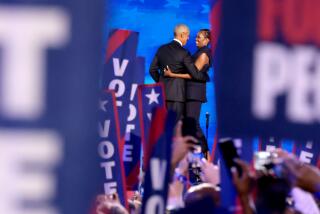Dialogue isn’t the last word
- Share via
Barack Obama loves reconciliation, but it isn’t all it’s cracked up to be. Sometimes it isn’t even possible, and let’s be honest, it isn’t always the point.
About six weeks ago, during his “More Perfect Union” speech on race that some heralded as the second coming of Abraham Lincoln, Obama had a choice between reconciliation and renunciation, and, true to form, he chose the former. He protested that he could “no more disown” the Rev. Jeremiah A. Wright Jr. than he could disown “the black community” or his own (sometimes politically incorrect) white grandmother. Really?
Right about now, his much-heralded tutorial on race relations is looking more like Richard Nixon’s “Checkers” speech than the Gettysburg Address. Because, after last Tuesday’s formal renunciation of his ties to Wright -- and presumably also his white grandmother and all blacks -- Obama looks not only tardy but thoroughly hypocritical. Didn’t Obama’s vaunted speech call for an open national dialogue on race, a subject he said was too important to ignore? Didn’t he urge us to address those “old wounds” that still fester today? Whether you agree with him or not, isn’t that exactly what Wright was doing last week when he reappeared in public to make more provocative statements on race and politics?
That’s no way to start a dialogue, Mr. Obama. You don’t call on people to talk and then renounce someone for speaking his mind. Because Wright didn’t really say anything new last week, it seems that his only new sin is that he called Obama’s bluff and, well, sparked another national dialogue on race. Which, of course, points to the absurdity of Obama’s call for more racial dialogue in the first place.
Obama evidently hoped a racial dialogue would amount to a tidy academic seminar in the well-behaved, elite Ivy League, about home mortgage lending rates, test scores or economic opportunity. Presumably, after the lecture there would be time for questions and answers, maybe even some light refreshments, and no one who mattered would go on the attack.
Or better yet, maybe he imagined one of those interminably self-congratulatory racial roundtables at which the self-appointed black representative speaks to the Latino, Jewish and Asian chieftains to discuss their peoples’ grievances, after which they’d all shake hands, pat themselves on the backs for “talking together” and herald a new day in race relations. Maybe they’d air the proceedings on public television or, at the very least, National Public Radio.
But lovely as it sounds, apart from the elite spokespeople, that’s not the way race is lived and felt in America. For most people, it’s not about statistics or civil rights cases, politics or access to healthcare. It’s not even about redress or reconciliation. Rather, it’s about something much deeper and more visceral, less quantifiable and more heartfelt. It’s about memories and respect, hurt feelings and long grudges, fears and expectations.
As the late cultural critic Neil Postman noted, for decades social scientists have fooled themselves into thinking that their field was indeed a science rather than a form of theology. They use “regression analysis” and fancy equations to quantify what are often subjective feelings. Yes, some things can be counted -- we can know how many blacks drop out of high school or are stopped by police in any given year -- but we can’t quantify the sources of the small indignities, real or imagined, that people feel they suffer at the hands of Americans of other races. Did that man look at you that way and make you feel uncomfortable because he’s prejudiced? Maybe, probably, sometimes. In any case, what are we going to do about it?
Unlike Obama’s facile moral equivalence between Wright and his white grandmother, we can’t “bring together” everyone who has been glared at by a real or imagined bigot and those possible racists themselves. Nor can we do much to address the unambiguous racial incidents that Americans of all colors do indeed endure every day. In this remarkably diverse country, there will never be a moment when all our grievances will be addressed and forgiven.
We can aggressively prosecute and protest against actual discrimination, but the body politic cannot do much about the hurt feelings and, in Wright’s case, paranoia and distrust that egregious past mistreatment of blacks has engendered. A nation is like a vast extended family, and we’re not always going to get along with our crazy cousins or that peculiar aunt. And we’ll never forget the way that uncle once made us feel. We can’t expect constantly civil, high-minded dialogue and relations around the Thanksgiving table. We have to show up; we should show up. But as in so many families, come November, thoughts of seeing relatives are sure to conjure up as much dread as anticipation.
More to Read
Get the L.A. Times Politics newsletter
Deeply reported insights into legislation, politics and policy from Sacramento, Washington and beyond. In your inbox twice per week.
You may occasionally receive promotional content from the Los Angeles Times.










